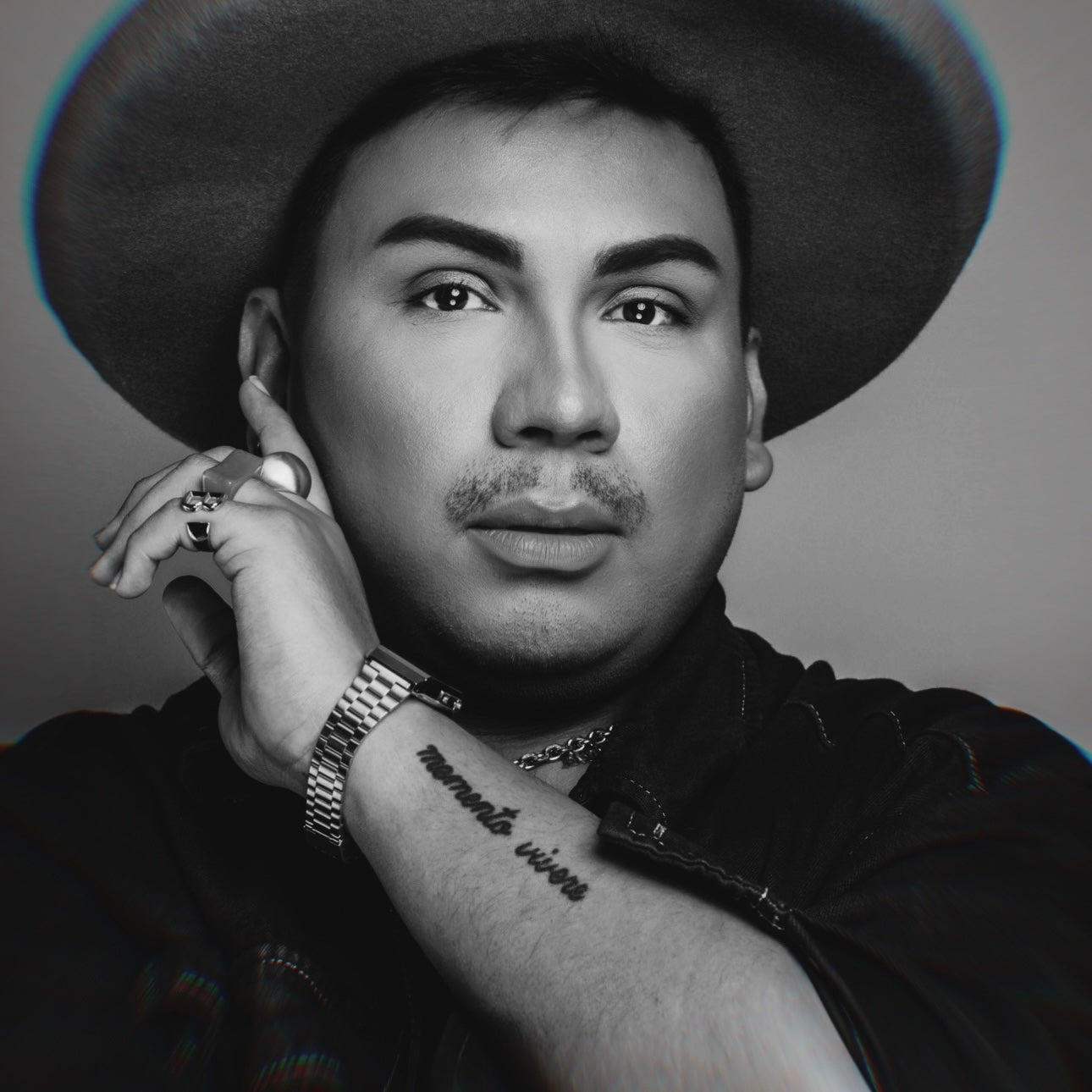

Aber Prieto is a Mexican-American writer and brand strategist with success in luxury retail and private equity brands. In 2022, Aber, formerly known as Abraham, was diagnosed with multiple identities, specifically OSDD1b. This diagnosis cemented his advocacy for mental health and raising awareness for others, including LGBTQIA individuals living with multiple identities and plurality. The fifteen known identities are currently writing their first novel and reside in Houston, TX, with their life partner and their three cats.
Aber Prieto es un escritor Mexicano-Estadounidense y estratega de marcas con éxito en tiendas de lujo y de capital privado. En 2022, a Aber, anteriormente conocido como Abraham, fue diagnosticado con múltiples identidades, específicamente OSDD1b. Este diagnóstico cimentó su abogacía a la salud mental y la creación de conciencia para los demás, incluidas las personas LGBTQIA que viven con múltiples identidades y pluralidad. Las quince identidades conocidas actualmente están escribiendo su primera novela y residen en Houston, TX, con su compañero de vida y sus tres gatos.
Something Happens In The Water; A Novel In The Making
In the late 1950s, the sleepy town of Bethesda, Texas, gained fleeting fame when a local accident revealed the mystical healing powers of Sunny Side Lake. The catch? Only the first person to stumble into the lake's mysterious waters while something unknown caused them to be troubled could be healed.
Fast forward to the present day, where Daniel, a distressed wanderer with a haunted past, finds refuge working at Casa Del Sol, a lakeside inn. As he tends to guests who flock to the lake hoping for a miracle, Daniel hides a child and a dark secret he's desperately running from.
As tension builds and secrets simmer beneath the surface, a looming storm threatens to unravel everything. With the inn's guests growing increasingly desperate and the lake's enigmatic powers stirring, Daniel must confront his inner demons and decide if he can believe in the lake's magic—and his own will to survive.
In a tale where emotional battles meet supernatural mysteries, can Daniel find redemption in Bethesda's troubled waters, or will the town's hidden truths drag him under?

Learn More About Multiple Identities,
plurality, suicide prevention and resources available to you.
FAQ's
-
What is dissociative identity disorder?
Dissociative Identity Disorder (DID) is a mental health condition where a person has two or more distinct identities, formerly referred to as personalities. These identities take control of the person’s behavior at different times. It’s often a result of severe trauma during early childhood, like abuse or neglect.
-
What is OSDD1b?
OSDD1b stands for "Other Specified Dissociative Disorder, subtype 1b." It’s similar to DID but the person doesn’t have fully separate identities. Instead, they may have parts or alternate identities ("alters") that influence their behavior and thoughts, but these parts are less distinct than in DID. Most individuals with this diagnosis experience co-consciousness.
-
How do DID and OSDD1b vary?
The main difference is in how distinct the identities or alters are. In DID, the identities are very separate and have their own names, ages, and characteristics. These identities are segmented by amnesia. In OSDD1b, the parts may not be as distinct and can feel more like different moods or aspects of the same person rather than completely separate identities. Individuals with OSDD1b can still experience some dissociative amnesia, but to a less extent.
-
What does it take to diagnose someone with multiple identities?
To diagnose DID or OSDD1b, a mental health professional looks for signs of multiple distinct identities or alters, significant memory gaps (more than just forgetfulness), and symptoms causing major problems in daily life. They’ll usually conduct interviews, questionnaires, and sometimes psychological tests.
-
What does living with multiple identities feel like?
Living with multiple identities can be confusing and exhausting. People might experience memory lapses, find themselves in places without knowing how they got there, or hear voices inside their head. It can feel like sharing your mind with other people. These diagnoses often affect personal and social relationships as well as social reactions.
-
Is there treatment or a cure for multiple identities?
There’s no cure, but treatment can help manage symptoms. Therapy, particularly a type called trauma-focused therapy, is the main treatment. Medications can also help with symptoms like anxiety or depression that often accompany these disorders.
-
What are compounded diagnoses and what other diagnoses are usually compounded with multiple identities?
Compounded diagnoses mean having more than one mental health condition at the same time. People with DID or OSDD1b often also have PTSD, depression, anxiety, or personality disorders. There can also be other complications with chemical imbalances. So much more research is needed.
-
Is it rude to ask about how someone developed multiple identities?
It can be sensitive and potentially triggering to ask someone directly how they developed multiple identities, as it often involves trauma. It’s better to let them share their story if and when they feel comfortable.
-
Is it rude to ask about how someone developed multiple identities?
It can be sensitive and potentially triggering to ask someone directly how they developed multiple identities, as it often involves trauma. It’s better to let them share their story if and when they feel comfortable.
-
How many identities can someone have?
There’s no set number; it can range from a few to hundreds. The average is around 8-13 identities.
-
What is the link between multiple identities and autism?
There’s some evidence suggesting a higher prevalence of dissociative disorders among people with autism, possibly due to heightened vulnerability to trauma. However, the exact link isn’t fully understood.
-
What does treatment cost for someone with multiple identities?
Costs vary widely depending on location, insurance, and specific needs. Therapy sessions can range from $75 to $200 per hour, and long-term treatment and medication can become quite expensive. Financial aid or sliding scale fees might be available through some therapists. Unfortunately, as the research is limited, health care can be out of network.
-
Does being diagnosed with multiple identities affect your lifespan and what is the suicide rate amongst individuals?
While DID and OSDD1b themselves don’t necessarily shorten lifespan, the associated stress and co-occurring conditions like depression can increase suicide risk. Around 70% of those with DID have attempted suicide at least once.
-
Is there any link or connecting variables between being diagnosed with multiple identities and bipolar disorder or schizophrenia? How do these differ from DID or OSDD1b?
There can be some overlapping symptoms, like mood swings in bipolar disorder or hearing voices in schizophrenia. However, DID/OSDD1b are primarily about multiple identities, whereas bipolar disorder involves extreme mood changes, and schizophrenia involves a break from reality (psychosis). It’s crucial to get an accurate diagnosis as the treatments differ significantly.
Resources Available To You
The Trevor Project is the leading suicide prevention and crisis intervention nonprofit organization for LGBTQ+ young people. We provide information & support to LGBTQ+ young people 24/7, all year round.
National Alliance on Mental Illness (NAMI)
What started as a small group of families gathered around a kitchen table in 1979 has blossomed into the nation's leading voice on mental health. Today, we are an alliance of more than 600 local affiliates who work in your community to raise awareness and provide support and education that was not previously available to those in need.
We can all help prevent suicide. The 988 Lifeline provides 24/7, free and confidential support for people in distress, prevention and crisis resources for you or your loved ones, and best practices for professionals in the United States. Just dial 9-8-8.



